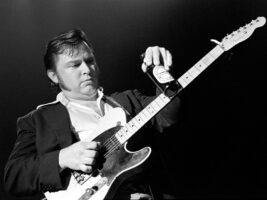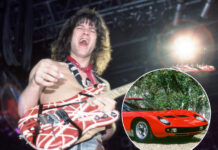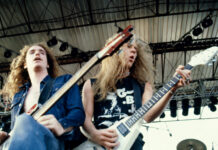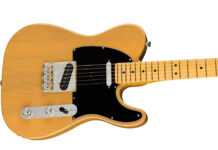
Five Incredibly Influential Guitarists Who Deserve More Credit
The world is full of talented guitarists and it seems that a small percentage of them end up hogging most of the mainstream spotlight, resulting in legions of brilliant guitar players not getting the credit they deserve during their career.
READ MORE: The Story Of Dave Grohl’s Signature Gibson DG-335
Sometimes, these artists are discovered later on when the guitar superstars they influenced mention them in interviews. In this article, we’ll take a closer look at five guitarists who never got the credit they deserved for the influence they have had on future generations of guitarists.
Terry Kath
Terry Kath was a criminally underrated guitarist whose career was tragically cut short at the age of 31 by an accidental discharge of a firearm. Kath was the founding guitarist of the band Chicago – a band whose horn-driven sound often overshadowed Kath’s guitar playing (and limited the commercial appeal of the band), but those guitar parts were essential to the music they made.
Just because he was underrated from a mainstream perspective doesn’t mean that he didn’t draw attention from other guitarists. Jimi Hendrix was a massive fan of Kath’s playing and once called him “the greatest guitarist in the universe.” If you listen closely to the guitar parts in Chicago’s hit song, 25 or 6 to 4, you will get a good idea of why Hendrix bestowed such praise on him.
Danny Gatton
Danny Gatton has been described as the “world’s greatest unknown guitar player,” and while he has become somewhat more well-known in the years since his passing, during his career, he was largely unknown in mainstream circles. However, to his guitar-playing peers, he was a legend, receiving high praise from artists like from Steve Vai, who stated in a 2011 interview with Guitar Aficionado that Gatton “comes closer than anyone else to being the best guitar player that ever lived.” Other notable artists he influenced include Billy Gibbons, Dave Grohl, John Mayer, Joe Bonamassa, Brad Paisley, and Keith Urban.
Gatton’s unique style of playing was able to bridge the gap between country artists and rock artists and inspire players on both sides. Tragically, he passed away at the age of 46 in 1994, and his own records never really did very well, even though he did get signed to a major label in 1991 just as his career was starting to take an upward turn. In 1992 and 1994, he released a couple of jazz albums that contrasted starkly with the wave of grunge that seemed to be overtaking the mainstream during that span and he tragically took his own life in October of 1994. But Gatton’s style was never about following trends. Album sales and magazine covers are not always accurate measures of success. Gatton’s success lies in the incredible influence that he still has on artists who discover his music today.
Robby Krieger
Robby Krieger made a name for himself as the guitar player for The Doors, a band that was obviously vastly overshadowed by Jim Morrison’s vocals and mystique. The absence of a bass player in the band also contributed to Krieger having to carve out his own style. Still, Krieger is a brilliant guitar player well-versed in flamenco, jazz, and blues. His style varies widely from songs with a flamenco flair, such as Spanish Caravan, to his solos in a song like Five to One, to the slide work in some of the solo work that he did after The Doors. He was also able to improvise quite well in a live setting, with Morrison going off on one of his poetic musings.
Krieger is a well-rounded guitarist, and The Doors simply wouldn’t have been the same band without him. But he somehow gets lost in the shuffle when we talk about influential guitarists even though The Doors were a very successful band. This may be due to the fact that Jim Morrison takes up most of the oxygen in that conversation, along with Ray Manzarek, who was also brilliant. But Krieger is certainly a guitarist to look up to.
Roy Buchanan
Roy Buchanan was one of the people responsible for shaping what we know today as the Telecaster sound. He would use volume and tone swells to get an almost steel guitar sound from his old Tele. His playing was very expressive. He allegedly turned down a position in The Rolling Stones at one point in the 1970s. But he was drawing a lot of praise from the rock and country worlds of guitar playing.
His career was cut short by problems with alcohol. He ended up committing suicide in jail after he was arrested for public intoxication. He also had a period in his career in the 1980s where he didn’t record any music because he was fed up with others trying to tell him how to play music. He only returned after Alligator Records promised him that he would have full artistic freedom.
Lonnie Mack
If you’ve traced the lineage of various guitar techniques back far enough, chances are you’ll come across the name Lonnie Mack. Many classic rock icons developed their sound by trying to emulate certain aspects of Mack’s playing. He played a Flying V with a Bigsby vibrato creatively affixed to the body and his use of that system on his debut album, The Wham of That Memphis Man! in 1964 is what many people have claimed to be the origins of the term “whammy bar”.
Mack was a massive influence on artists like Jeff Beck, Jimi Hendrix, Duane Allman, Eric Clapton, Stevie Ray Vaughan, Keith Richards, Jimmy Page, and a laundry list of others. Even with praise from all those rockstars, his guitar (“Number 7”) is probably more famous than he is. Even his passing in 2016 was overshadowed by Prince who died on the same day.
The post Five Incredibly Influential Guitarists Who Deserve More Credit appeared first on Guitar.com | All Things Guitar.
Source: www.guitar-bass.net












